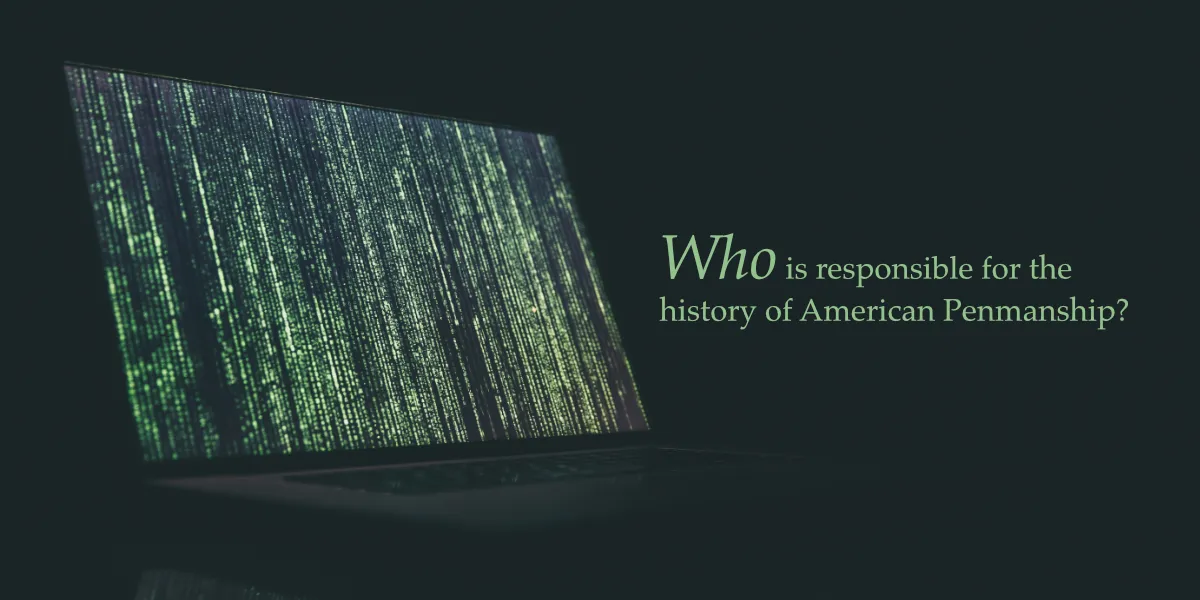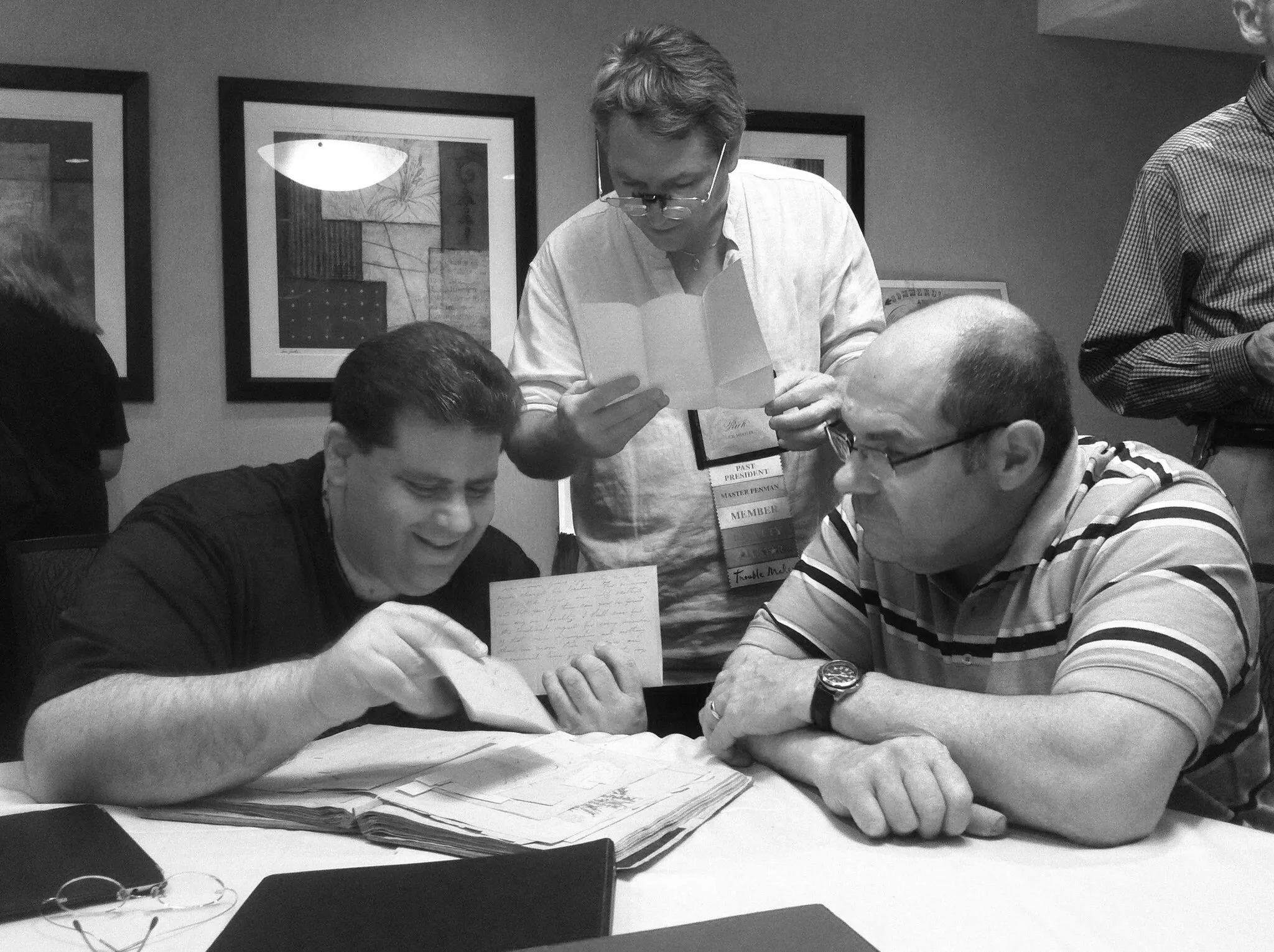Pay It Forward – Archiving American Penmanship
Written on October 25th, 2024 by D. T. Grimes
Earlier this month, the Internet Archive suffered a distributed denial of service (DDoS) attack, resulting in a loss of services that lasted nearly a week. While the Archive came back online on 10/24/24, the lack of access to historic penmanship material during this outage shines an important light on the fragility of the preservation efforts that penmen have contributed to over the last ten years. This event calls into question the sense of security that any penmanship historian should have regarding cloud hosting and reiterates the importance of building your own, local archive and making scanned historic material in your possession free and easily available when requested.
The “Pay It Forward” principle
When I took my first steps into this fascinating world of historic American Penmanship, I was quickly brought face-to-face with the monumental work that had been accomplished by the great historians before my time. Of course, I am talking about the likes of Dr. Joe Vitolo, whose efforts resulted in dozens of original essays, interviews, and books being scanned and freely digitally distributed to the public for the first time.
These books, often secured by Vitolo at his own expense, require careful handling, scanning, file preparation, and distribution efforts that can often go unseen by a young penman poring over them for the first time. From my experience scanning works for the archive section of this website, I was given a new perspective on how valuable and time-consuming this type of penmanship contribution can be. Although there are plenty of CD files containing rare penmanship books for sale on sites like eBay (often containing the scans that Vitolo, himself, produced), Joe elected to never charge for his contributions. He simply bought, scanned, assembled, and distributed these wonderful relics for free.
If you ask Dr. Vitolo why he doesn’t charge for these works, he’ll cite the 2000 drama Pay It Forward staring Haley Joel Osment. The spirit of “pay it forward” is that the recipient of a favor does a favor for three others rather than “paying it back.” In this spirit, Joe’s early enthusiasm was stoked by his generous friendships with Michael Sull and John DeCollibus, and he hopes to multiply that enthusiasm for penmanship by providing the favor of access to his scanned materials to countless students of penmanship across the world.
Joe Vitolo (left), Rick Muffler (center), and John DeCollibus (right) enjoy looking over historic specimens together at a convention.
This “Pay It Forward” principle has been upheld by most modern penmanship archivists. The University of Scranton has a wide variety of digital penmanship scans available on their website. Christopher Yoke has scanned and released dozens of images of historic specimens from his personal collection. Michael Ward has selflessly donated his time, money, and endless enthusiasm to travel from Vancouver, Canada to New York City on several occasions to scan the monumental Healey Scrapbooks. David Kaminski has spent decades acquiring, cataloging, and writing about his massive collection of American handwriting specimens. And most recently, Ross Green has scanned and distributed some incredible books in his collection through his own Archive.org account. This is to name only a few of the generous individuals and organizations who have lent their wallets and time to this grand effort.
By maintaining this status quo, we have ensured for the last decade that these materials were instantly and widely accessible to any individual in the world who showed an interest in American Penmanship, regardless of their economic background. The practice of purchasing materials, scanning them, and then charging for access to them (or requiring membership to a site or organization in exchange for access) is widely frowned upon. It capitalizes on the work of penmen long returned to the dust, and unfairly limits access to these important historic materials to only those with the ability to pay.
Protecting American Penmanship history
Not everyone has the ability to purchase original specimens or collect rare books. They take up a lot of space, require careful handling and storage, and generally aren’t as convenient to use as their digital counterparts. However, if the Archive.org attack has shown us anything, it is that we cannot rely on the digital files that are hosted online to always be there. What happens to our history if the original specimens are lost to a flood, fire, or other natural disaster and the Internet Archive suffers another attack? Redundancy is key in these disaster scenarios, and you can help.
I implore you to begin constructing your own local archive of the public domain American Penmanship works that you come across online. This can be as simple as a file on your desktop where you save the PDFs from Archive.org, or as robust as carefully cataloging photographs from eBay listings — even the ones you don’t buy! This type of community archiving effort will result in a number of distributed digital collections that are much safer in the long run. It also guarantees that YOU have access to the offline historic materials and, most importantly, can continue your practice of the Art when things go wrong.
Of course, please respect the copyright of newly created penmanship works, especially when the artist is still alive or their estate has an opportunity to earn an income from their efforts. Operating as a professional penman is a financially strenuous task, and we need to do everything we can to combat plagiarism and piracy if we want people to pursue it as a career. When it comes to work in the public domain, however, you have a right to save the files for your own use. Respectfully, exercise it!
Finally, in light of the breach, I encourage you to change your password if you have an Archive.org account and use a password manager and security key to help keep your accounts secure in the ever-changing digital landscape.
Further Reading
- Collections Care — Library of Congress
- Emergency Management — Library of Congress
- Resilient Storage Systems — Digital Preservation Coalition


